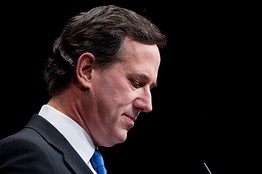Sex, Lies and Rick Santorum
The politics of the double standard on social issues.
By William McGurn
WSJ.com
When Barack Obama was campaigning for president in 2008, he declared that marriage is between a man and a woman. For the most part, his position was treated as a nonissue.
Now Rick Santorum is campaigning for president. He too says that marriage is between a man and a woman. What a different reaction he gets.
There's no mystery why. Mr. Santorum is attacked because everyone understands that he means what he says.
President Obama, by contrast, gets a pass because everyone understands—nudge nudge, wink wink—that he's not telling the truth. The press understands that this is just one of those things a Democratic candidate has to say so he doesn't rile up the great unwashed.
It's arguably the most glaring double standard in American life today. It helps explain why candidates with social views that are fairly conventional among ordinary Americans—the citizens of 31 states including California have rejected same-sex marriage when put to a vote—find themselves depicted as extreme. It also speaks to why even some who share Mr. Santorum's social views nonetheless fear that his outspokenness on these issues will only undermine his candidacy.
That has led some folks to suggest that Mr. Santorum simply drop these issues altogether. Their hope is that by concentrating his energies solely on Mr. Obama's management of the economy and foreign affairs, Mr. Santorum might avoid dividing his party and America. However reasonable the argument may be on paper, it is simply not practical.
It's not practical, first, because Mr. Santorum is running as what he is, a conviction politician. Having been dismissed for months by Republicans hostile to his social views, he is not likely to take their advice now. He appreciates that he did not get where he is today by trimming his sails.
Indeed, that's one reason he has now overtaken Mitt Romney as the front-runner in Michigan. Mr. Romney is behind because Republican voters have yet to be persuaded he stands for anything. Mr. Santorum is ahead because even those who might not sign onto all his social particulars are hungry for a nominee who does not bend with the wind.
Dropping the social issues is also not practical for another reason: The media won't let him. When Mr. Obama used a prayer breakfast earlier this month to suggest that the Gospel of Luke was a call for raising taxes on the wealthy, the press corps yawned. When Mr. Santorum complained about the "phony theology" behind the president's worldview, suddenly it landed on every front page and lead every news show.
So what's the answer? The answer is that when Mr. Santorum discusses these issues, he needs to fold them into his larger narrative about the free society. That narrative has to do with pointing out the dependency that comes with an expanding federal government, the importance of family, and the threat to freedom when, say, the Ninth Circuit Court of Appeals or a Health and Human Services secretary can substitute their own opinions on these issues for the judgment of the American people.
Mr. Santorum comes to the task well equipped. He echoes Ronald Reagan, for example, when he talks about how small government requires strong families. Or when he's pointing out the intolerance of a federal government bent on forcing religious individuals and institutions to underwrite practices (e.g., contraception and sterilization) they regard as abhorrent.
There is, however, one area where Mr. Santorum needs to demonstrate a discipline it's not yet clear he has. That is the ability to resist the efforts to drag him out of the public questions into the weeds of theological debate.
In short, Mr. Santorum must resist the temptation to run for president on "Humanae Vitae," the 1968 papal encyclical prohibiting artificial contraception. Of late the former Pennsylvania senator has pointed out that, despite his personal views, he has voted for contraceptive funding in the past. Alas, he has also said that artificial contraception is the kind of moral issue he plans to talk about as president.
These are important issues. They have large implications for society, and those few who have actually read "Humanae Vitae," as Mr. Santorum has, might be surprised to find how prophetic that document was in its warnings about the consequences of the contraceptive mentality for society, including the weakening of the marriage bond. A presidential debate, however, is simply not the vehicle for clarifying the coherence of the Catholic Church's view of human sexuality.
That doesn't mean Mr. Santorum should compromise his views. To the contrary, he needs to keep his comments simple, clear, and focused on the political point he is hoping to make. That in turn will require letting pass a great deal that he might be itching to respond to.
Mr. Santorum cannot change the double standard. With a little discipline, however, he need not let himself be defined by it.
Write to MainStreet@wsj.com


